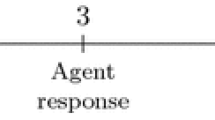Summary.
A class of employment contracts entailing production targets and consequent rewards is studied. In a nondiscriminatory environment, a principal hiring many agents faces the problem of writing a common contract which induces the highest possible effort from each one of his agents. While a very high target may get the best out of highly skilled agents, low skilled ones tend to shirk. On the other hand, although low targets make every agent put positive effort, there are efficiency losses from the high skilled agents. Also, in such environments the principal often has better information regarding the skills of all his agents than what each agent has regarding the rest of the agents at work. We show that if skills of agents are sufficiently close, the informed principal earns strictly higher profits by offering incomplete contracts as against being specific, as incomplete contracts reduce flow of information and induce indirect competition amongst agents.
Similar content being viewed by others
Author information
Authors and Affiliations
Additional information
Received: May 19, 2000; revised version: August 28, 2001
Rights and permissions
About this article
Cite this article
Roy, J., Serfes, K. When vagueness induces indirect competition: strategic incompleteness of contracts. Econ Theory 20, 603–621 (2002). https://doi.org/10.1007/s00199-001-0234-y
Issue Date:
DOI: https://doi.org/10.1007/s00199-001-0234-y




